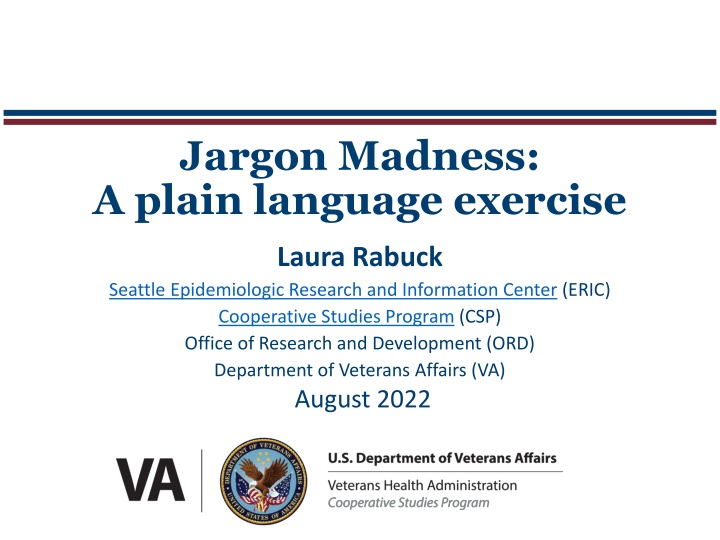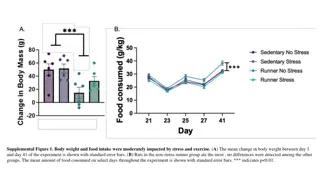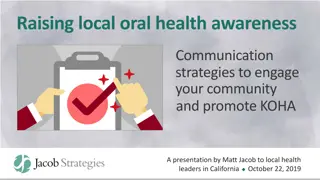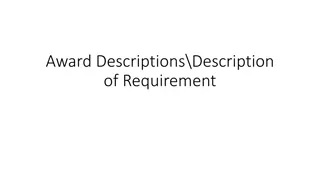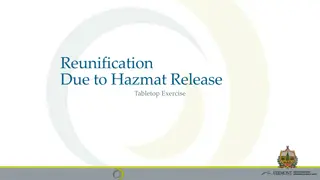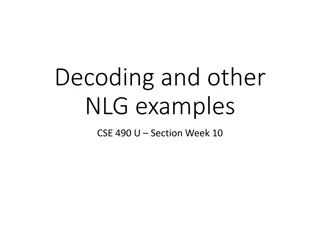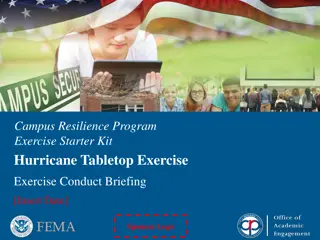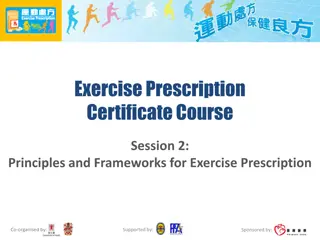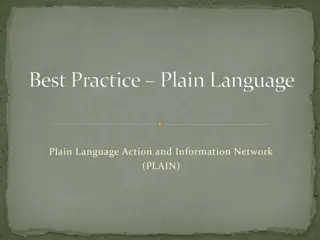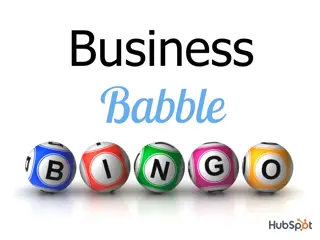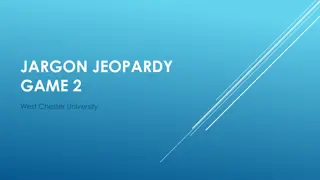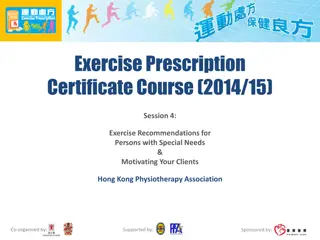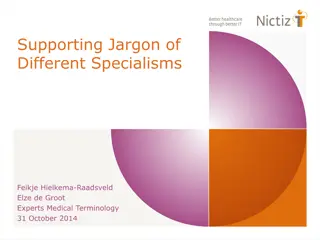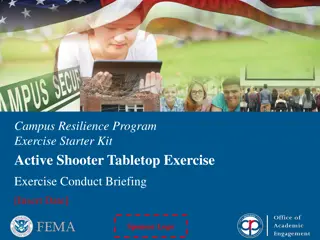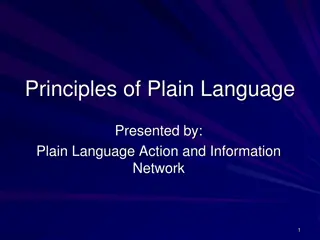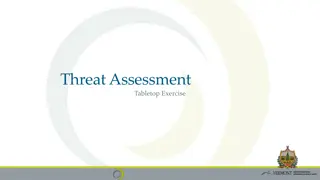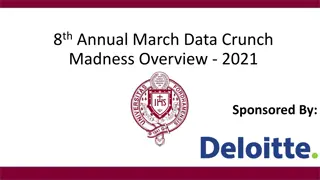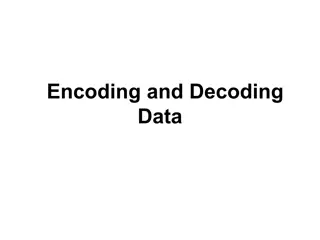Decoding Jargon Madness: A Plain Language Exercise
Explore the concept of Jargon Madness, a plain language exercise to tackle complex jargon in professional settings. Discover why addressing jargon is crucial, what jargon entails, and how to host your Jargon Madness event. This engaging approach encourages clear communication, teamwork, and fosters a jargon-free environment. Dive into the world of jargon and unleash the power of plain language communication.
Download Presentation

Please find below an Image/Link to download the presentation.
The content on the website is provided AS IS for your information and personal use only. It may not be sold, licensed, or shared on other websites without obtaining consent from the author.If you encounter any issues during the download, it is possible that the publisher has removed the file from their server.
You are allowed to download the files provided on this website for personal or commercial use, subject to the condition that they are used lawfully. All files are the property of their respective owners.
The content on the website is provided AS IS for your information and personal use only. It may not be sold, licensed, or shared on other websites without obtaining consent from the author.
E N D
Presentation Transcript
Jargon Madness: A plain language exercise Laura Rabuck Seattle Epidemiologic Research and Information Center (ERIC) Cooperative Studies Program (CSP) Office of Research and Development (ORD) Department of Veterans Affairs (VA) August 2022
Disclaimer The views expressed here are those of the author and do not necessarily reflect the position or policy of the Department of Veterans Affairs or the United States Government. 2
Disclaimer (2) Can t name commercial products, services, or non-federal organizations allowed We use lots of those and as a result context might be missing Email me if something is unclear or to fill in the blanks: Laura.Rabuck (at) va.gov 3
This will cover Why do something like Jargon Madness? What is Jargon Madness? Developing your own Jargon Madness event using our experiences as a starting point 4
So why Jargon Madness? Having a response to jargon is universal (or so says my experience) It s a plain language appetizer It s a conversation starter that cuts across the org chart It s part engagement, part education It s a fun way to get people to think about the volume of jargon in our work how jargon can be unclear how it conflicts with our efforts to communicate clearly It allows for asynchronous participation It fits well with remote or hybrid offices 5
What is jargon? Special words or expressions that are used by a particular profession or group and are difficult for others to understand (Source) The technical terminology or characteristic idiom of a special activity or group (Source) Obscure and often pretentious language marked by circumlocutions and long words, confused unintelligible language (Source) Our winner! 6
College basketball event Jargon Madness is loosely based on the college basketball event of a similar, trademarked name In the college basketball version 64 teams are put into a bracket. Each pair plays one game, winner advances to the next round. The bracket decreases by half with each round (64 teams to 32 teams to 16 to 8 to 4 to 2) until there s a champion Takes place over (only!) 2 weeks 7
Business version A popular business magazine started Jargon Madness in 2012 and modeled it on the college basketball event Their goal: identify the single most annoying example of business jargon and thoroughly embarrass all who employ it and any of these other ridiculous expressions They chose 32 abominable expressions Participants voted on one matchup daily via a bird themed social media app Took place over just a month 9
Our Jargon Madness Took place in 2013 (Champion: Giving 110%) 2014 (Champion: Bandwidth) 2020 (cancelled due to COVID-19) 2021 (Champion: Boil the ocean) 2022 (Champion: Bleeding edge) Used different approaches each time started with a large printed bracket, paper voting via a decorated shoe box and moved to everything being online All started thanks to a former colleague, Margaret 10
Preparation checklist Confirm leadership buy-in and if there s an audience Confirm your champions/sponsors and partners Confirm staffing support Confirm language Decide bracket size and corresponding timeline Decide (and test) where you ll host it and how voting will work Decide how to identify jargon Develop a marketing plan, however small (but mighty!) Research and draft ideas for education Decide on post-event survey Start now! 3/16/2023 will arrive quickly 11
Leadership and audience Leadership Confirm with necessary levels of leadership When explaining Jargon Madness, tie it to existing education, employee engagement, or other known leadership goals or efforts Audience Understand the audience(s) you re trying to reach so you can create an experience that works for them Consider starting small as proof of concept and then expand 12
Champions and partners Identify a champion: A fierce supporter who provides resources, expertise, and moral support. An informal role held by an executive or someone in senior management Identify partner(s): People, groups, or offices who will collaborate with you on some or all tasks Neither are required, but could be instrumental in leading Jargon Madness across a wide audience 13
Staffing We ve used a team of 2 by default First year is the most time consuming, subsequent ones can be somewhat faster/easier The more you prepare the better Education posts, style guide, voice/tone, images, etc It moves fast And you have the rest of your job to manage as well 14
Confirm language (1) Don t use these trademarked phrases NCAA March Madness March Madness Sweet Sixteen Elite Eight Final Four Work with your agency legal office on specifics Use alternatives to break up rounds: Smashing Sixteen, Epic Eight, Fabulous Four 15
Confirm language (2) Be purposeful in your voice and tone We set up the voting to be for the most confusing contender in each pair. That fit our goal to encourage dialogue instead of shaming. Most people use jargon and what s considered jargon isn t universal. Create a reflective space to encourage change! 16
Bracket size and timeline We ve used 64, 32, and 16 contenders 32 contenders is pretty perfect 16 contenders is short but could be great for a first event While using 64 only adds an additional round, it required that we find additional jargon to supplement the submissions (we didn t get enough) and that additional round made the whole thing feel much longer Consider aligning your start with the college basketball version How will you set up the bracket pairs? Random or purposefully? 17
Our 2022 timeline (1) 32 contenders over 5 weeks March 23: opened Jargon Madness space March 24 31: submit jargon suggestions April 1 6: Round 1 voting April 7 12: Round 2 voting April 13 18: Round 3 voting April 19 22: Round 4 voting April 25 28: Round 5 voting April 29: Champion announced 18
Our 2022 timeline (2) Admin steps for each round Voting is open posts Last day to vote in this round posts At least one education or engagement post per round Encouraging and responding to conversations Creating surveys for voting using survey software Updating the bracket Use software where you can create a checklist and assign due dates to different tasks to keep you on track 19
Hosting and voting plans Approaches we ve used Large paper bracket on wall, vote by paper survey Host using an internal blog, vote using survey software Host using collaboration software, vote using survey software We use what s free and readily available Conquer the bracket format re: accessibility Slide deck Spreadsheet Coding something more seamless 20
Identify jargon contenders Ask for suggestions from the audience Decide in advance if there are boundaries. Are contenders limited to the technical definition of jargon or are buzzwords, idioms, metaphors, and analogies also allowed? Also doubles as marketing Be prepared to supplement suggestions if you don t get enough Search online for business jargon , corporate jargon , office jargon , office buzzwords to find articles and lists Since our first Jargon Madness people have sent suggestions in the off-season 21
Marketing plan Guest blog posts, newsletter blips, announcements at meetings, ask people to forward marketing emails to email groups they manage Sky is the limit. We ve only been treading water 22
Education (1) You ll have a somewhat captive audience for multiple weeks! If you use a digital format, having educational posts breaks up the voting has started/voting is ending soon posts Consider varying the type 23
Education (2) Introduce jargon alternatives For us that has been medical/healthcare jargon, academic jargon, business jargon Introduce jargon awareness events Two Australian efforts: Drop the Jargon Day and Jargon Free Fridays Introduce research about why we use jargon Adult learners like to know why Introduce research about the impacts of jargon Preferably that s specific to your audience Introduce humorous things for levity Introduce the history of jargon Connect jargon to agency values, characteristics, customer experience, or similar efforts Introduce other blogs or newsletters that continue the conversation Email me for a full list of resources we ve used 24
Post-event survey Consider when to make it available On a thank you page of the final vote? After the champion is announced? Take the ongoing approach and have survey available throughout so someone can complete it if they don t stick with the whole bracket 25
Things to anticipate Be ready to intercept and redirect things 1. But X isn t jargon. It s a {insert metaphor, idiom, analogy}. 2. But X isn t jargon. It s the name of my office and I m the Director. 3. But X isn t jargon. I use X . Are you saying I m confusing? 4. But X isn t jargon. Everyone knows what it means 5. But X isn t jargon. Everyone should know what it means 6. X jargon is the worst. Why does anyone use it? 26
Challenges (1) Accessible brackets Accessible brackets that also work with our digital platforms Striking a balance with education material that s useful for new participants without boring those who ve participated for several years 27
Challenges (2) Having good graphics for branding and visual interest Planning sufficiently far enough in advance for marketing that would reach a wider audience But this might also speak to a need for additional staffing or partnership 28
Good luck If you lead a Jargon Madness effort and want to share your experiences or suggestions, I d love to hear about them If you don t plan on leading Jargon Madness but want to share ideas, still interested If you re a VA employee (hi!) and want to talk about coordinating efforts or check out our space, let s talk Laura.Rabuck (at) va.gov 29
Thank you! To Jen and Jane for being champions To Sydney and Christina for lightening the load To VA CSP leadership for their commitment to improving communication To everyone who has participated! And a special thank you to the research staff of Seattle HSR&D and Seattle ERIC who ve seen the big picture since day 1, pinged me with suggestions, made sure they had the bandwidth to participate, felt that this was in their wheelhouse, and really gave it 110%. Y all rock. 30
